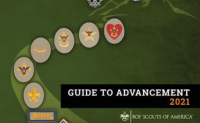 Go while the going is good /Â Knowing when to leave may be the smartest thing that anyone can learn
Go while the going is good /Â Knowing when to leave may be the smartest thing that anyone can learn
-“Knowing When To Leave“Â by Burt Bacharach & Hal David
We all remember when we first took the plunge into Scout leadership. Usually it’s in Cub Scouts, and when our sons wanted to join and the Cubmaster or committee chair told us that the den needed a den leader, we were the ones who stood in place when everyone else took a step backward. As our sons grow, so does our involvement in our units. It changes substantially but we end up settling into our role in our troop and getting comfortable doing it.
But what happens when we find ourselves longing for something different? Maybe a step back as our sons age out, or hopefully a step forward into another role in Scouting. How do you know when is when?
Often it’s when we no longer have any boys in the troop. That is sometimes the natural signal that it’s time to move along. That’s not to say we must – there are Scouters who have stayed on far beyond their sons’ time as a youth, in some cases to see them get married, have kids of their own and start their new Scouting careers as an adult.
Other times we don’t realize that our effectiveness is waning, or that we’re getting bored with the job and don’t have the same enthusiasm as we did in earlier days. Strategist and coach Larry Putterman wrote an article recently giving advice to executives on when you know it’s time to step down. Putterman mentions a variety of scenarios, many of which can apply to volunteer Scouters as well:
- Have you accomplished what you wanted to accomplish? Are you able to continue to reinvent? Do you continue to have fresh ideas? Most of us, when taking on a new role, are full of ideas to improve our units, or to set things on the right track, or to help bring people together to work toward the common good. When you start to run out of new ideas, though, this is sometimes a sign that you have accomplished your goals. Now I can’t think of any organization, in or out of Scouting, that can truthfully say they have done everything they need to get done – there’s always more to do, but if you as a person have started to slow down in your rate of innovation, maybe it’s time to move on to something else.
- Is your passion shifting? Do you have other dreams? Is this what you wanted to do for the rest of your life? Perhaps you see areas outside your current role where you feel you can lend more passion and do more good. A new job sometimes brings with it the fresh feeling of starting over, of new challenges, and that might be just what you need in order to keep your enthusiasm up.
- Can someone else do the job better? Have you groomed a successor and are they ready to lead? Are you putting the good of the organization first? It may be clear in our own mind that we are the absolute best person for the job, and nobody could do as good as we can. When you think about it, though, that’s an extremely selfish attitude. By clinging to a job that someone else could do, you are denying them the opportunity to experience growth and helpfulness to others in that position. The organization can nearly always benefit from fresh ideas. I’ve always felt that your first action when taking a new job is to recruit your replacement, and I’m always on the lookout for someone who could take over for me when the time comes. One advantage to this practice is that you can recruit the right person who shares your views and can continue to take the unit in the direction you’ve started.
The 1960s standard popularized by Dionne Warwick refers to the search for the right romantic relationship, but the advice pertains equally to those of us who may be entrenched in a Scouting position, and can give us the courage to fly while you still have your wings / Knowing when to leave will never let you reach the point of no return.
Image: Magnus Manske / Creative Commons Attribution 2.0 GenericÂ
This post first appeared on Bobwhite Blather.




There are a lot of positions in Pack/Troop/Crew that need to be staffed by someone that will supply a steady and reliable service to the unit.
Advancement coordinator, probably in the top five positions that must be staffed to provide advancement data to the Council. And must transmit the latest advancement data in a timely manner.
Membership is another very important position.
If the unit has a website this needs to be maintained to provide the unit with the latest news and announcements for consistent unit communication.
These positions can be staffed by the older scouter that may have more time to devote to the tasks at hand.
One will intuitively know when it is time to move on.
Michael, this is great advice. Scoutmasters or assistants who want to scale back can take a committee role and just concentrate on doing one thing.
Another position that seems to always be in short supply is unit commissioner. An involved Scouter with a thorough understanding of the program can transition into a commissioner’s role and help not only another unit but his or her district as well.
Thanks for your comment!
When things are stable and you’ve replaced yourself or been replaced.
Most folks have some abilities and skills that make them very suitable for some positions and not so suitable for other positions. Since 1987 I’ve mostly been scoutmaster or committee member. My current unit has an excellent SM and many competent committee members. So I retired. I’m way into AARP territory and my sons are married with children of their own. Time to go.